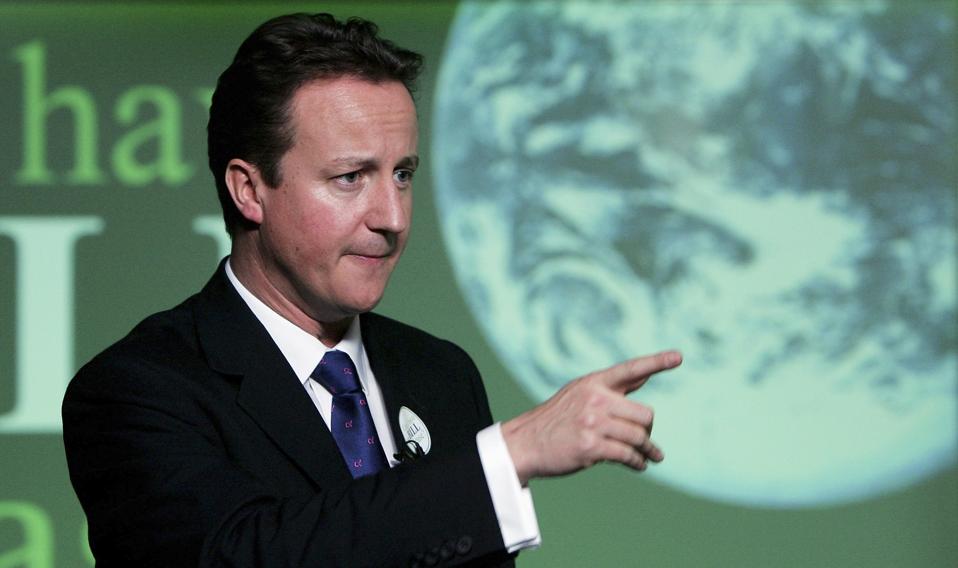Britain’s Conservative Party has been on the quite the eco journey: from then wannabe Prime Minister David Cameron buffing his green credentials in 2006 by hugging Huskies through to today’s announcement that, should it form the next government—which, on current polling is extremely unlikly—the Tories would scrap the Climate Change Act.
The Act—steered through parliament in 2008 by Labour’s Ed Miliband, the current Secretary of State for Energy Security and Net Zero—set strict carbon budgets and enabled the U.K. to make the greatest progress on carbon emissions in the developed world. At the time of the Act’s passing into law there little opposition: it was passed by parliament by an overwhelming cross-party majority, with only five MPs out of 646 voting against it. The Conservative Party, then the main opposition, even urged the Labour government to set tougher carbon reduction targets.
Earlier, in 1989, Conservative Prime Minister Margaret Thatcher called for a global convention on climate change during a speech to the United Nations, and three years later the then Conservative government signed up—along with almost all other countries—to the UN Framework Convention on Climate Change.
For many years, the Conservatives professed to be in favor of conserving the planet. Climate change was “one of the biggest threats facing the world,” warned Conservative Party leader David Cameron on his 2006 dog-sledding trip to a shrinking Norwegian glacier, adding that “we must have a much greater sense of urgency about tackling it.” Four years later, after urging people to “vote blue to go green,” he became the U.K. prime minister promising the “greenest government ever.”
In 2019, his successor as Prime Minister, the Tory leader Theresa May, turbocharged the Climate Change Act by committing the U.K. to legally binding net-zero emissions target for 2050, the first major economy to do so.
Tory Prime Minister Boris Johnson, a one-time climate change skeptic turned eco warrior, went even further than his predecessor by making greater climate pedges, including committing to the ban the sale of cars that run on gasoline and diesel by 2030. He also promised to construct 40 gigawatts of offshore wind farms over that same period.
Speaking after Johnson resigned as Prime Minister, Bob Ward, policy and communications director at the Grantham Research Institute on Climate Change and the Environment at the London School of Economics, said: “Having a conservative leader making the conservative case on climate change was important.”
Scrap
Boldness on climate change by previous Tory leaders has today been torched by Kemi Badenoch, the current leader. Her pledge that a Tory government would scrap the Climate Change Act has been described as a “backward step” by the CBI employers’ group.
“We want to leave a cleaner environment for our children, but not by bankrupting the country,” Badenoch said.
Energy secretary Ed Miliband claimed Badenoch’s pledge would be “an economic disaster and a total betrayal of future generations.”
Lord Deben, a Tory peer and former chair of the independent Climate Change Committee, said: “This reverses everything the Conservatives stand for.”
Deben, formerly John Gummer, an environment minister who served in Thatcher’s cabinet, added that Badenoch’s pledge would backfire politically.
Climate activists have also piled in. James Sutton, co-director of climate charity Possible, said: “The Climate Change Act has blazed a trail for the U.K.’s global leadership on climate action. Across the U.K., millions of people are already doing their bit to protect the environment. And it’s working—more than half of our energy is powered by clean renewables like sun and wind power, but we can’t stop now.”
He claimed that, thanks to the Climate Change Act, U.K. citizens benefit from lower utility bills, well-paid jobs, cleaner air and thriving nature, and “that’s what the British public wants.”
He continued: “The Climate Change Act is worth safeguarding not just because it will deliver a safe future for our children and grandchildren, but because limiting climate change also protects the natural world and landscapes that we all know and love. Any political party seeking to destroy that future is out of touch with the British people.”

